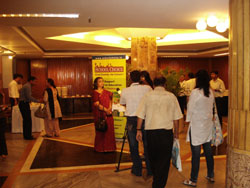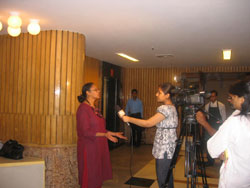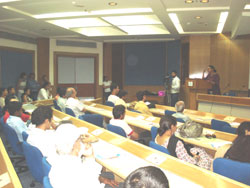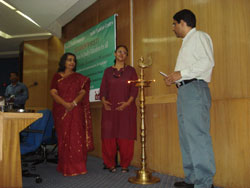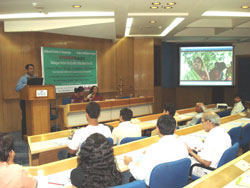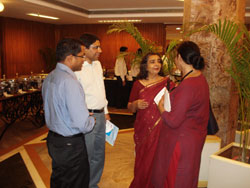 |
|
|||||||||||||
|
||||||||||||||||||||||||||
Home > Student First! Dialogue Series > July 2009 Dialogue
July 2009 Dialogue
School Board Exams: Assessment or Harassment?
Panel discussion on the recent announcement made by Mr Kapil Sibal
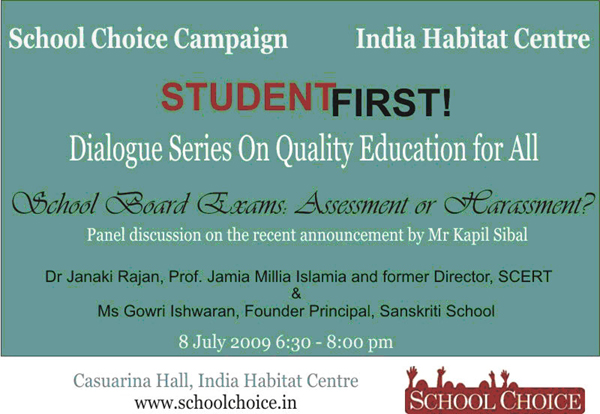
The School Choice Campaign in partnership with the India Habitat Centre launched STUDENT FIRST! Dialogue Series on Quality Education for All on 8 July 2009 with a provocative topic “School Board Exams: Assessment or Harassment?” following the recent announcement made by Mr Kapil Sibal to scrap 10th board exams as one of the innovative reforms in the education sector.
The discussion saw the coming together of two prominent educational experts representing the government and private perspectives- Mrs Gauri Ishwaran, Founder Principal of Sanskriti and recipient of the Padma Bhushan in 2004 and Dr Janaki Rajan, former Director of SCERT Delhi and Professor of Education Jamia Milia University. The evening's discussion highlighted the improper mode and misguided nature of assessment that is prevalent in our schools today. Both panelists agreed that the trauma caused by examination method of assessment is extraordinary and that, perhaps, it was time to take a serious relook at the service rendered by the board examinations, especially at Class X level.
Mrs Gauri Ishwaran drew upon her experiences as an educationist to speak about the types of assessment in schools today. She spoke about the three types of assessment - learnt, applicational and longitudinal. In Indian educational systems, assessments of the first two are generally carried out. She advocated incorporation of more out-of-the-box thinking in our school education that will spur innovation and create knowledge leaders. Mrs Ishwaran strongly supported independent assessment by schools and the accreditation of schools by independent agencies, which, she argued will allow market forces to identify quality schools.
Dr Janaki Rajan used her combined experiences as teacher, policy maker and social change agent to plead for the abolition of the Central Board of Secondary Education. She claimed that the examination processes of the Board were not fair, does not serve the purpose of assessing the students’ learning levels and stated several process errors in the functioning of the CBSE to buttress her case. With a decorated experience in the government, private and social sectors, Dr Rajan presented a strong and compelling case to allow schools greater autonomy in designing their curriculum and recommended School Leaving Certificates issued by the schools as a viable alternative to board examination results. She wished that schools would be able to measure achievements through an inclusive process and not through a one-size-fits-all policy that is currently being propagated by the Board Examinations.
The highlight of the discussion, an animated interactive open forum saw mixed views from representatives of schools, NGOs, education consultants, government departments and the youth. The session ended with the consensus that the present board examination system is flawed and needs either overhauling or to be scrapped.
- Check Press Release for the event
SUPPORT US |
||||||||
|
||||||||
EVENTS |
||||||||
|
||||||||









